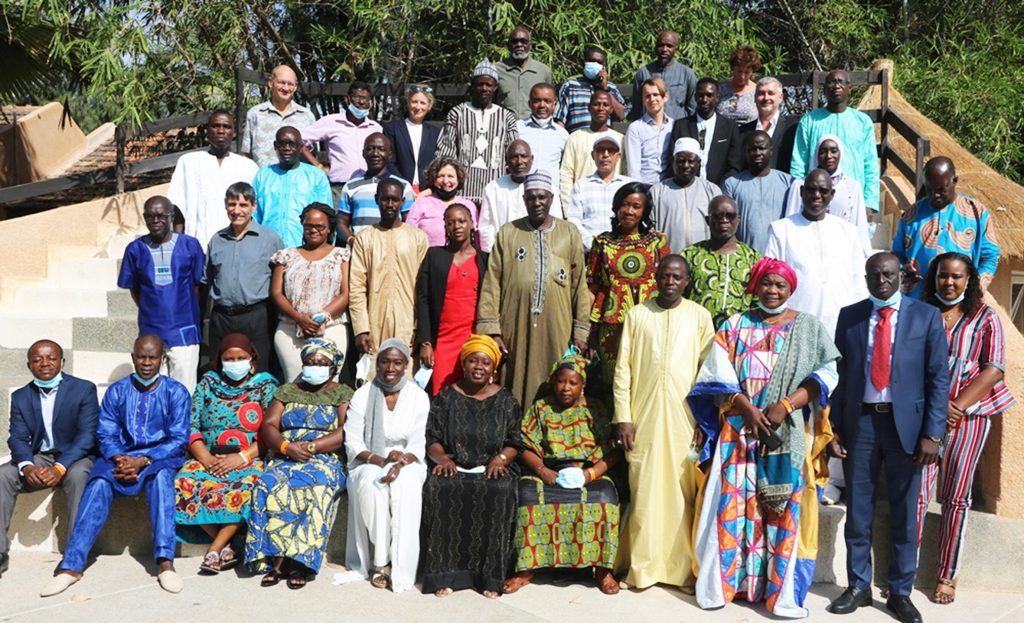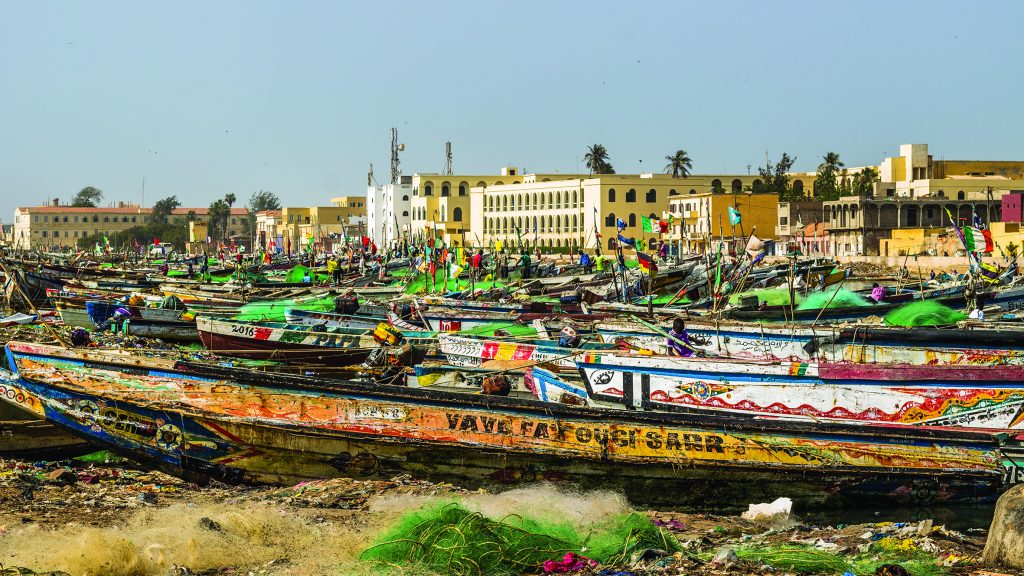Starting their international year on a high note, the African Confederation of Professional Organizations of Artisanal Fisheries (CAOPA) hopes to become a prominent platform
This article is by Beatrice Gorez (cffa.cape@gmail.com) of the Coalition for Fair Fisheries Arrangements (CFFA)
On the eve of the International Year of Artisanal Fisheries and Aquaculture (IYAFA 2022), artisanal fisheries have never been more essential to the survival of coastal communities and local populations across Africa. Speaking at the launch of the World Fisheries Day event organized in Senegal by the African Confederation of Professional Organizations of Artisanal Fisheries (CAOPA) in November 2021, AdamaDjalo, CAOPA vice-president, represented the perspective of women fish processors from Guinea Bissau. “During the COVID-19 crisis, despite harsh measures that have severely affected—and continue to affect—our livelihoods, men and women from our sector have shown their resilience and ability to provide essential food to African families,” she said.

The future will be challenging for African fishing communities. Global warming is already aggravating matters, posing challenges such as increasingly difficult navigation conditions at sea, coastal erosion, and migration of fish resources further offshore, to name a few. To make fishing communities more resilient in these difficult times, CAOPA is calling on governments to ensure access to fisheries resources and markets for small-scale fisheries—covered in SDG 14b—through the implementation of the FAO Voluntary Guidelines for Securing Sustainable Small-scale Fisheries in the Context of Food Security and Poverty Eradication (the SSF Guidelines).
CAOPA is calling on governments to ensure access to fisheries resources and markets for small-scale fisheries
This requires reforms, both in policy and in practices; that does not come easily. DawdaFoday Saine of Gambia, general secretary of CAOPA, expressed his pride that the organization, now present in 27 countries, has been successful in “giving our communities the confidence to claim their rights, and to assert their benefits, in social, economic and cultural terms and as managers of coastal ecosystems.”
But there was also some frustration. “Despite our efforts, all too often, our decisionmakers and their partners do not look at us, do not value us, ignore our needs, and favour others,” he said. “All too often, fishing licences are given out to destructive foreign industrial vessels. And all too often, agreements are signed with companies that destroy our coasts for exploiting gas, oil or for tourism. All too often, polluting industrial units like fishmeal factories, some of which steal our fish, are built at our doorstep. All of this is done in total secrecy. All of this is done at a huge cost to our coastal ecosystems, and to the artisanal fishing communities that depend on them for their livelihood.”
… these coastal areas should be entirely co-managed by the State and artisanal fishing communities
When CAOPA members gathered in Senegal for World Fisheries Day, it was to discuss how to ensure that African States walk the talk on supporting African fishing communities to thrive.
As the discussions started, they received some good news: CAOPA president GaoussouGueye had been elected co-ordinator of the African Continental Non-State Actors Platform, a consultative body set up with the support of the African Union development Agency (AUDA-NEPAD), and the InterAfrican Bureau for Animal Resources, in collaboration with FAO and funded by the European Union. “This platform has the ambition to mobilize all African fisheries stakeholders, professionals and civil society organizations alike, to help the continent meet its commitment to improve nutrition and food security, thanks to fisheries, and support sustainable livelihoods in African fisheries-dependent communities,” said Gueye.
The big three for IYAFA 2022
Based on CAOPA’s work over its 10 years of existence, more than 50 participants, from Africa’s continental and maritime artisanal fisheries, identified three priority areas for reforms and concrete action. The first one is to secure access to resources for African artisanal fisheries. States are asked to grant exclusive fishing rights to artisanal fishers in coastal areas. To ensure the sustainable management of coastal ecosystems and resources, these coastal areas should be entirely co-managed by the State and artisanal fishing communities, including through appropriate conservation tools such as protected marine areas designed and managed by fishery-dependent communities.

The second priority is safety at sea, which is crucial for SSF’s secure access to resources. The participants, therefore, emphasized that African countries should ratify and implement the Work in Fishing Convention (No. 188) of the International Labour Organization (ILO). The implementation of this Convention can help improve some essential elements that include: safety training for pirogue captains and crews; the use of new technologies; and raising awareness of fishers regarding safety issues.
Women are present at all stages of the artisanal fisheries value chain in African countries. They form the essential link that gets the fish to local and regional consumers. They are also the mainstay of families in artisanal fishing communities. Recognizing their role, giving them equal representation in professional organizations, in decision-making processes, and providing them with appropriate support are the priorities for securing access to resources and markets.
Micheline Dion Somplehi, a fish processor from Ivory Coast and the co-ordinator of the CAOPA women’s programme, summed it up: “Without women there will be no sustainable artisanal fisheries in Africa. Women perform miracles every day with small means, always improving the quality of their processed products, always finding new markets and improving the living conditions of their whole community. Their capacity for innovation is infinite. Whether it is to develop new processing techniques or to increase the availability of affordable fish as raw material for processing, supporting innovation in women’s activities is the key to the survival of our sector. Our States should give priority attention to supporting this, and also invest in the necessary services and infrastructure that will allow such innovations to be successful.”
Women are also involved in artisanal fish farming, a good way to supplement their supply of raw materials and to cope with periods when fishing is stopped (during biological rest, for example). Fatoumata Diallo Sirebara from Mali, whose husband is an artisanal fisherman, is passionate about developing artisanal fish farming in Africa: “I started small, growing vegetables, then growing fish in containers. I got young women to join me in this activity of artisanal aquaculture that everyone thought was reserved for men because people thought it’s expensive, and you need big capital to do it. These young women saw that they could do it. Anyone can do it. As I work without pesticides or fertilizers, I use the water from the fish tanks for the vegetable I grow in containers. When the fish are big, we sell them live, at West African CFA Franc (XOF) 2,000 (US$4) per kg. People come, catch what they want and, if they want, we smoke the fish for them, for an extra XOF 500 (US$1) per kg. Growing fish and vegetables in containers can be done anywhere in Africa. Anything can become a productive garden or a fish pond.”
Despite all the positivity about the opportunities IYAFA 2022 offers for advancing their agenda, African fishing communities have a big concern: The competition from other sectors included in the Africa ‘Blue Economy’ strategy—financially and politically powerful sectors such as oil and gas exploration, tourism and fishmeal factories—could jeopardize the future of artisanal fishing. The artisanal fishing communities’ interests lie in protecting ocean resources from such predatory sectors.
In their view, the precautionary approach must guide the development of the Blue Economy. They ask African States to carry out independent social and environmental impact assessments, with the utmost transparency and with the participation of affected coastal communities. No new ocean-use activity should be allowed by States, nor supported by donors, if it negatively impacts ecosystems and coastal fishing communities. States should put in place transparent mechanisms for consultation and conflict resolution between users of maritime spaces, allowing for informed and active participation of all affected fishing communities.
A new dawn is rising
All around the world, fishing communities see young people deserting the sector. In this context, it was remarkable to see the participation of young fishers and women in fisheries in this gathering. Take, for example, Angelo Matagili from Tanzania, in charge of the CAOPA youth programme. He talked inexhaustibly about ways to harness solar energy for the benefit of fishing communities. Or Dorcas Malogho from Kenya, representing coastal women in fisheries. Or Nana Kweigyah of the Canoe and Fishing Gear Owners Association of Ghana, who read the final statement, emphasizing the need for fishers to be responsible.
“Our efforts must not be ruined by greed and corruption, which occur mostly in the darkness of offices, but sometimes on our beaches, in the artisanal sector. As the saying goes, when you point a finger at someone, there are three fingers pointing back at you. Our first duty is to be responsible players,” said Kweigyah.
He insisted on the responsibilities young CAOPA leaders carry: “Throughout the next year, we, the younger generation of CAOPA leaders, will assist our leaders by relentlessly knocking on the doors of our decisionmakers, at the regional and national African levels, and ask them to entrust us with the co-management of our coastal zones.” Kweigyah said that they will request support, in the form of appropriate infrastructure and services, to catalyze innovations in the value chain, especially for women’s activities.”
With so many opportunities to make IYAFA 2022 a success in Africa, the younger generation of CAOPA leaders has a clear path forward, as Kweigyah concluded: “With the energy of our youth, with the experience of our elders, following in their footsteps, passing through the doors they opened for us, we have only one message to send to our decisionmakers: ‘Get ready, we’re coming!’ ’’
For more
World Fisheries Day 2021 CAOPA declaration
https://caopa.org/wp-content/uploads/2022/01/Declaration-WFD-2021-EN.pdf
For the post-COVID-19 period, CAOPA calls for decent working conditions for artisanal fisheries
Africa Blue Economy Strategy